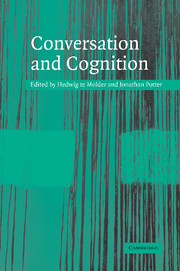Book contents
- Frontmatter
- Contents
- List of contributors
- Acknowledgements
- Transcription conventions
- 1 Talking cognition: mapping and making the terrain
- Part I The interface between cognition and action
- 2 Validating ‘observations’ in discourse studies: a methodological reason for attention to cognition
- 3 Language without mind
- 4 Using participants' video-stimulated comments to complement analyses of interactional practices
- 5 From paradigm to prototype and back again: interactive aspects of ‘cognitive processing’ in standardized survey interviews
- 6 A cognitive agnostic in conversation analysis: when do strategies affect spoken interaction?
- Part II Cognition in action
- References
- Index
2 - Validating ‘observations’ in discourse studies: a methodological reason for attention to cognition
Published online by Cambridge University Press: 22 September 2009
- Frontmatter
- Contents
- List of contributors
- Acknowledgements
- Transcription conventions
- 1 Talking cognition: mapping and making the terrain
- Part I The interface between cognition and action
- 2 Validating ‘observations’ in discourse studies: a methodological reason for attention to cognition
- 3 Language without mind
- 4 Using participants' video-stimulated comments to complement analyses of interactional practices
- 5 From paradigm to prototype and back again: interactive aspects of ‘cognitive processing’ in standardized survey interviews
- 6 A cognitive agnostic in conversation analysis: when do strategies affect spoken interaction?
- Part II Cognition in action
- References
- Index
Summary
A prominent conversation analyst once questioned my interest in the cognitive foundations of social interaction, saying things like, ‘What's the point?’ ‘Can it help me do my work?’ ‘What discursive practices can it reveal?’ I did not find the scepticism surprising. While the matter is debatable – as publication of this volume demonstrates – interest in, tolerance for, or direct references to, cognition are actively eschewed by a sizable number of researchers within ‘discourse studies’ (in which I include, alphabetically, applied linguistics and sociolinguistics, argumentation studies, conversation analysis, discourse analysis, discursive psychology, ethnography of communication, language pragmatics, rhetorical communication and semiotics). This chapter addresses those researchers and shows at least one way in which attention to cognition can make a valuable contribution to our work – in fact, analysts all along have been attending to cognition in one of the ways I discuss here, while denying that attention to cognition is relevant.
Of course, I need to be more specific and narrower about what I mean by ‘cognition’. The term can refer to speakers' underlying inner states at the moment of producing discourse objects (perceptions, emotions, wants, intentions, etc.), and also applies to more enduring cognitive content (beliefs, concepts, knowledge structures, values, memories) and response biases (e.g., personality traits, habits, attitudes), as well as to processing algorithms that are of interest in cognitive science.
- Type
- Chapter
- Information
- Conversation and Cognition , pp. 57 - 78Publisher: Cambridge University PressPrint publication year: 2005
- 10
- Cited by



